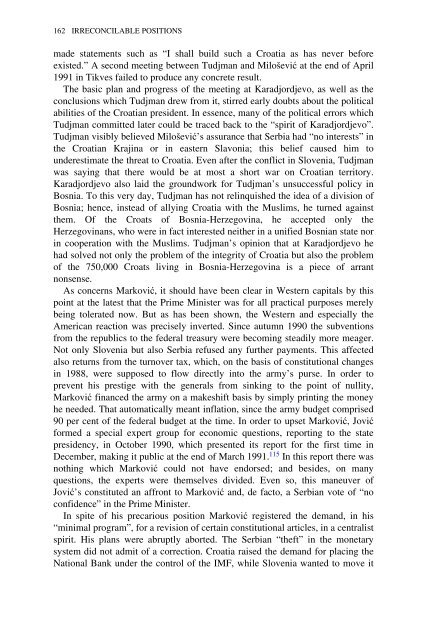Yugoslavia: A History of its Demise - Indymedia
Yugoslavia: A History of its Demise - Indymedia
Yugoslavia: A History of its Demise - Indymedia
Create successful ePaper yourself
Turn your PDF publications into a flip-book with our unique Google optimized e-Paper software.
162 IRRECONCILABLE POSITIONS<br />
made statements such as “I shall build such a Croatia as has never before<br />
existed.” A second meeting between Tudjman and Milošević at the end <strong>of</strong> April<br />
1991 in Tikves failed to produce any concrete result.<br />
The basic plan and progress <strong>of</strong> the meeting at Karadjordjevo, as well as the<br />
conclusions which Tudjman drew from it, stirred early doubts about the political<br />
abilities <strong>of</strong> the Croatian president. In essence, many <strong>of</strong> the political errors which<br />
Tudjman committed later could be traced back to the “spirit <strong>of</strong> Karadjordjevo”.<br />
Tudjman visibly believed Milošević’s assurance that Serbia had “no interests” in<br />
the Croatian Krajina or in eastern Slavonia; this belief caused him to<br />
underestimate the threat to Croatia. Even after the conflict in Slovenia, Tudjman<br />
was saying that there would be at most a short war on Croatian territory.<br />
Karadjordjevo also laid the groundwork for Tudjman’s unsuccessful policy in<br />
Bosnia. To this very day, Tudjman has not relinquished the idea <strong>of</strong> a division <strong>of</strong><br />
Bosnia; hence, instead <strong>of</strong> allying Croatia with the Muslims, he turned against<br />
them. Of the Croats <strong>of</strong> Bosnia-Herzegovina, he accepted only the<br />
Herzegovinans, who were in fact interested neither in a unified Bosnian state nor<br />
in cooperation with the Muslims. Tudjman’s opinion that at Karadjordjevo he<br />
had solved not only the problem <strong>of</strong> the integrity <strong>of</strong> Croatia but also the problem<br />
<strong>of</strong> the 750,000 Croats living in Bosnia-Herzegovina is a piece <strong>of</strong> arrant<br />
nonsense.<br />
As concerns Marković, it should have been clear in Western capitals by this<br />
point at the latest that the Prime Minister was for all practical purposes merely<br />
being tolerated now. But as has been shown, the Western and especially the<br />
American reaction was precisely inverted. Since autumn 1990 the subventions<br />
from the republics to the federal treasury were becoming steadily more meager.<br />
Not only Slovenia but also Serbia refused any further payments. This affected<br />
also returns from the turnover tax, which, on the basis <strong>of</strong> constitutional changes<br />
in 1988, were supposed to flow directly into the army’s purse. In order to<br />
prevent his prestige with the generals from sinking to the point <strong>of</strong> nullity,<br />
Marković financed the army on a makeshift basis by simply printing the money<br />
he needed. That automatically meant inflation, since the army budget comprised<br />
90 per cent <strong>of</strong> the federal budget at the time. In order to upset Marković, Jović<br />
formed a special expert group for economic questions, reporting to the state<br />
presidency, in October 1990, which presented <strong>its</strong> report for the first time in<br />
December, making it public at the end <strong>of</strong> March 1991. 115 In this report there was<br />
nothing which Marković could not have endorsed; and besides, on many<br />
questions, the experts were themselves divided. Even so, this maneuver <strong>of</strong><br />
Jović’s constituted an affront to Marković and, de facto, a Serbian vote <strong>of</strong> “no<br />
confidence” in the Prime Minister.<br />
In spite <strong>of</strong> his precarious position Marković registered the demand, in his<br />
“minimal program”, for a revision <strong>of</strong> certain constitutional articles, in a centralist<br />
spirit. His plans were abruptly aborted. The Serbian “theft” in the monetary<br />
system did not admit <strong>of</strong> a correction. Croatia raised the demand for placing the<br />
National Bank under the control <strong>of</strong> the IMF, while Slovenia wanted to move it
















